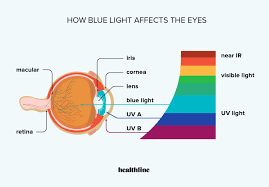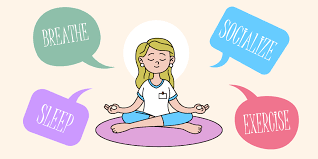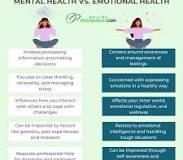Blue Light: The Good, the Bad, and the Ugly
In today’s world, we are constantly surrounded by screens emitting blue light. From our smartphones to our laptops, blue light is everywhere. While blue light has some benefits, such as boosting our mood and alertness during the day, it can also have negative effects on our health if we are exposed to it for too long.
The good:
Blue light is a natural component of sunlight and plays an important role in regulating our circadian rhythm. Exposure to blue light during the day can help us stay alert and focused, improve our mood and cognitive function, and even boost our metabolism. Additionally, blue light therapy has been shown to be an effective treatment for seasonal affective disorder (SAD), a type of depression that occurs during the winter months.
The bad:
While exposure to blue light during the day can be beneficial, exposure at night can disrupt our sleep-wake cycle. Blue light suppresses the production of melatonin, a hormone that regulates sleep. This means that if we are exposed to blue light before bedtime, it can take longer for us to fall asleep and reduce the quality of our sleep once we do.
Additionally, prolonged exposure to blue light from screens can cause eye strain and fatigue. This is because blue light scatters more easily than other colors in the visual spectrum, making it harder for our eyes to focus.
The ugly:
Recent studies have suggested that prolonged exposure to blue light from screens may increase the risk of macular degeneration. Macular degeneration is a condition that causes damage to the retina and can lead to vision loss over time.
So what can we do?
There are several things we can do to reduce our exposure to blue light:
- Use screen filters or glasses with lenses that block blue light.
- Avoid using electronic devices before bedtime.
- Adjust your device’s brightness settings so that they are not too bright, especially in low light conditions.
- Take breaks from screens every 20-30 minutes to give your eyes a rest.
In conclusion, while blue light has some benefits, such as boosting our mood and alertness during the day, it can also have negative effects on our health if we are exposed to it for too long. By taking steps to reduce our exposure to blue light, we can protect our eyes and improve the quality of our sleep.
6 Tips to Reduce Blue Light Exposure and Improve Sleep Quality
- Adjust your device settings to reduce blue light exposure.
- Avoid using electronic devices two to three hours before bedtime.
- Use dim red lights for night lights instead of bright white or blue ones.
- Wear blue-light blocking glasses when using electronic devices late into the night.
- Install an application on your computer or phone that filters out blue light from digital screens and monitors.
- Take regular breaks from looking at a screen, especially during long periods of time
Adjust your device settings to reduce blue light exposure.
In today’s digital age, we spend a significant amount of time staring at screens, whether it be our smartphones, tablets, or laptops. While these devices have made our lives easier and more connected than ever before, they also emit blue light that can have negative effects on our health.
One simple way to reduce your exposure to blue light is by adjusting the settings on your device. Most modern devices have a “night mode” or “blue light filter” option that can be turned on to reduce the amount of blue light emitted.
By turning on this feature, your device will automatically adjust the color temperature of the screen to a warmer tone that is less harsh on your eyes. This can help reduce eye strain and fatigue, as well as improve your ability to fall asleep at night.
To turn on this feature on an iPhone or iPad, go to Settings > Display & Brightness > Night Shift. From there, you can schedule Night Shift to turn on automatically during specific times or adjust the color temperature manually.
On an Android device, go to Settings > Display > Night Light. You can toggle this feature on and off manually or schedule it to turn on automatically during specific times.
In conclusion, adjusting your device settings is a simple yet effective way to reduce your exposure to blue light. By taking this small step towards protecting your eyes and improving your sleep quality, you can enjoy the benefits of technology without sacrificing your health.
Avoid using electronic devices two to three hours before bedtime.
If you’re having trouble sleeping, it might be time to take a closer look at your electronic device usage. Blue light emitted by these devices can disrupt your natural sleep cycle and make it harder for you to fall asleep. One simple tip to reduce your exposure to blue light is to avoid using electronic devices two to three hours before bedtime.
This may seem like a difficult habit to break, especially if you’re used to scrolling through social media or watching TV before bed. However, the benefits of reducing blue light exposure are worth it. By giving yourself a break from screens before bedtime, you’ll allow your body’s natural sleep cycle to kick in and improve the quality of your sleep.
Instead of using electronic devices, try reading a book or practicing relaxation techniques such as meditation or deep breathing exercises. You can also create a relaxing bedtime routine that doesn’t involve screens, such as taking a warm bath or sipping on herbal tea.
Remember, small changes can make a big difference when it comes to improving your sleep habits. By avoiding electronic devices two to three hours before bedtime, you’ll be taking an important step towards better sleep and overall health.
Use dim red lights for night lights instead of bright white or blue ones.
When it comes to creating a sleep-friendly environment, the type of lighting we use can make a big difference. While bright white or blue lights can suppress the production of melatonin and disrupt our sleep-wake cycle, dim red lights can actually promote better sleep.
The reason for this is that red light has a longer wavelength than blue or white light, which means it scatters less in the atmosphere and is less likely to disrupt our natural circadian rhythm. Additionally, red light does not suppress melatonin production in the same way that blue or white light does.
Using dim red lights for night lights can be especially helpful for children who may be afraid of the dark. Red lights create a warm and comforting environment that can help them feel more relaxed and calm before bedtime.
So next time you need a night light, consider using a dim red one instead of a bright white or blue one. Your body (and your children’s) will thank you for it!
Wear blue-light blocking glasses when using electronic devices late into the night.
If you’re someone who uses electronic devices late into the night, you may have noticed that it’s harder to fall asleep or stay asleep. This is because the blue light emitted by these devices can interfere with our natural sleep-wake cycle. However, there is a simple solution to this problem: wear blue-light blocking glasses.
Blue-light blocking glasses are specially designed to filter out blue light from electronic devices. By wearing them when using your phone, tablet, or laptop at night, you can reduce your exposure to blue light and improve the quality of your sleep.
Research has shown that wearing blue-light blocking glasses before bedtime can increase melatonin production and improve sleep quality. Additionally, they can also reduce eye strain and fatigue caused by prolonged screen time.
So if you’re someone who likes to use electronic devices late into the night, consider investing in a pair of blue-light blocking glasses. They may just be the key to getting a better night’s sleep and protecting your eyes from long-term damage caused by prolonged exposure to blue light.
Install an application on your computer or phone that filters out blue light from digital screens and monitors.
Install a Blue Light Filter App for Better Sleep and Eye Health
Many of us spend hours each day staring at digital screens, whether it be our computer, phone, or tablet. However, prolonged exposure to blue light emitted by these screens can have negative effects on our sleep and eye health. The good news is that there is a simple solution: installing a blue light filter app.
A blue light filter app works by adjusting the color temperature of your screen to reduce the amount of blue light emitted. This helps to reduce eye strain and fatigue, as well as improve sleep quality by reducing the disruption of melatonin production.
There are many different blue light filter apps available for both computers and phones. Some popular options include f.lux for computers and Twilight for Android phones. These apps are easy to install and use, and many allow you to customize the settings to fit your preferences.
By installing a blue light filter app on your devices, you can protect your eyes from the negative effects of prolonged screen time while also improving the quality of your sleep. So why not give it a try? Your eyes (and sleep) will thank you!
Take regular breaks from looking at a screen, especially during long periods of time
Taking Regular Breaks from Screens: The Importance of Resting Your Eyes
In today’s digital age, it’s not uncommon to spend long periods of time staring at screens, whether it be for work or leisure. However, this can take a toll on our eyes and overall health if we don’t take regular breaks.
One important tip for reducing the negative effects of blue light exposure is to take regular breaks from looking at screens. This means taking short breaks every 20-30 minutes to rest your eyes and prevent eye strain and fatigue.
During these breaks, it’s important to look away from your screen and focus on something else for a few minutes. This could mean looking out a window, taking a walk outside, or simply closing your eyes and resting them for a few moments.
Not only does taking regular breaks help reduce eye strain and fatigue, but it also improves productivity and focus. Studies have shown that taking short breaks throughout the day can actually increase productivity by improving mental clarity and reducing stress.
So next time you find yourself staring at a screen for an extended period of time, remember to take regular breaks to rest your eyes and improve your overall well-being. Your eyes (and brain) will thank you!




